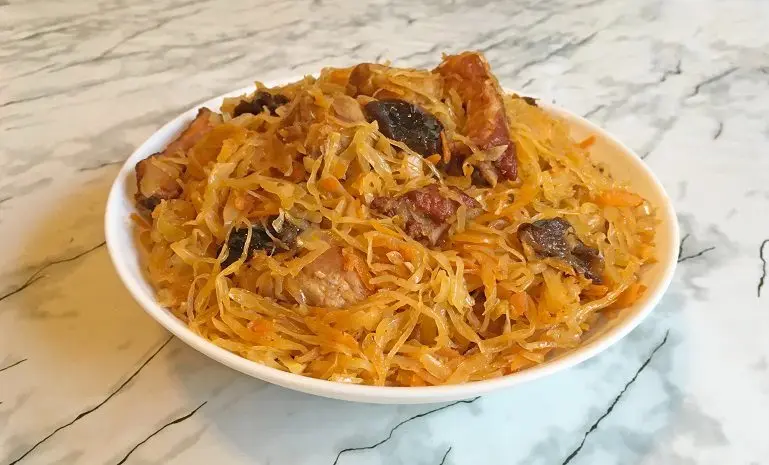Bigus (bigos) – is a stewed fresh and sauerkraut with meat, which is characterized by a thick texture, slightly sour taste and hints of smoked meat. The dish is considered Polish, but in addition to its native country, it is popular in Ukraine, Lithuania and Latvia. According to legend, King Vladislav Jagiello from the Grand Duchy of Lithuania brought the bigus recipe to Poland. Usually bigus is served with fatty dishes, since its sourness promotes digestion. It is also an excellent snack for vodka and “male” tinctures: pepper, horseradish, Borodino, etc.
There are several hundred recipes for making bigus, but it differs from ordinary stewed cabbage in a number of ways:
- a mixture of fresh white and sauerkraut is used in approximately equal proportions, while sauerkraut adds a characteristic sourness, and fresh – gives juiciness;
- the composition must necessarily contain boneless meat, ideally 2 types at once – regular and smoked. The choice of meat is wide: beef, pork, chicken (the worst option due to low fat content) and even sausages, such as sausages;
- classic bigus is characterized by smoky notes, usually achieved through the corresponding meat, but pitted prunes are also added to enhance the effect.
As additional products, you can use any available vegetables, such as onions or carrots, as well as mushrooms.
The authors of some recipes call for separately frying meat and stewing cabbage, then combining and stewing them together a little. However, this contradicts the very spirit of the dish – initially it was cooked by hunters in a cauldron on a fire, which excludes the preparation of ingredients separately.
Classic bigus recipe
Ingredients:
- fresh white cabbage – 600 g;
- sauerkraut – 400 g;
- meat (pork) – 500 g;
- smoked ribs – 200 g (optional);
- pitted prunes – 70 g;
- animal fat (or vegetable oil) – for frying;
- dry wine (or water) – 150-200 ml;
- onions – 1 piece;
- carrots – 1 piece;
- tomato paste – 40 g (optional);
- bay leaf – 3 pieces;
- allspice – 3 peas;
- salt, black pepper – to taste.
Ribs (only boneless pulp will be used) can be replaced with other similar smoked meats or add 20-30 g more prunes. Instead of fat for frying, vegetable oil is also suitable, but the taste will not be as rich. The composition of seasonings and spices can be changed at your discretion.
Natural dry wine enriches aroma and taste. Red varieties of minimal acidity are often used. White wines are too acidic and can be paired with chicken, but sauerkraut should be soaked in water first to reduce the acidity. Wine is not an essential ingredient in bigus and can be easily replaced with plain water.
Technology of preparation
1. Cut the meat into pieces of 5-7 cm, it is possible together with the fatty layers.
2. Heat fat or vegetable oil in a heavy-bottomed saucepan, saucepan, cauldron (preferably) or multicooker bowl. Fry the meat over medium heat until the liquid has completely evaporated and a slight blush.
3. Cut the onion into quarters of rings, grate the carrots on a coarse grater, chop fresh cabbage into medium pieces, the main thing is not very small, otherwise the bigus will boil too much. Slightly mash the cabbage so that it releases the juice.
4. Add onions and carrots to the meat, fry over medium heat until the vegetables are soft.
5. Cut the ribs into strips, then cut the meat from the bones and divide it into pieces. If other smoked meats are used, prepare them in the same way. The meat must be boneless.
6. Add smoked ribs and tomato paste to the roasted vegetables, lightly salt, pour in wine or water (the liquid should be on the same level as the vegetables), mix. Simmer for 5 minutes with the lid open.
7. Add fresh and sauerkraut (pre-press until dry). Stir, cover tightly, simmer over low heat for 40 minutes, stirring occasionally.
Attention! If sauerkraut is very sour or dry white wine is used in the recipe, you should first soak the cabbage in cold water for 60-90 minutes, then squeeze it out.
8. Pour the prunes with bitter water, leave for 3-5 minutes, then remove and dry with paper towels. Add prunes to bigus. Do not cut dried fruits into pieces, otherwise the pulp will boil and turn into porridge.
9. Add bay leaf, allspice peas, salt and pepper to taste. Mix.
10. Cover with a lid, simmer over low heat for 20 minutes.
11. Divide the ready bigus into portions and serve hot with fresh bread. It is believed that the dish fully reveals its taste only the next day, when it is infused under a closed lid.

Interestingly, when heated, bigus loses its taste and aroma to a minimum, so it is cooked in large batches and frozen.









